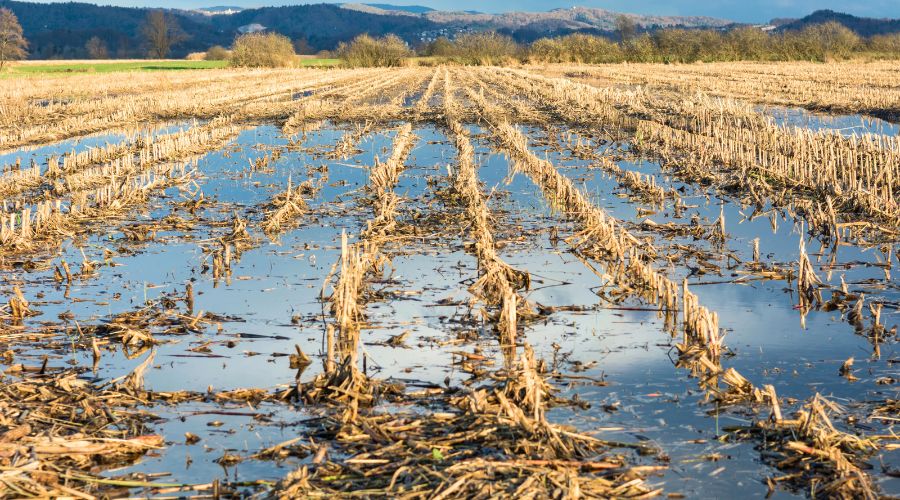‘Wake-up call’: Defra’s data reveals impact of wettest 18 months on record
11th July 2024
Defra has just revealed data that shows the disastrous impact of the wettest 18 months on record on UK vegetable and fruit production.

Data from the Department for Environment, Food and Rural Affairs shows that year-on-year vegetable yields decreased by 4.9% to 2.2 million tonnes in 2023, and the production volumes of fruit decreased by 12% to 585,000 tonnes.
The yields of individual crops have been reduced by between 0.4% and 9.2%.
Scientists said that climate breakdown caused by the burning of fossil fuels is likely to bring more extreme weather to the UK, including more frequent floods and droughts.
Start of the season delayed
Data also revealed that areas for vegetables have been reduced by 6.5% at 101 thousand hectares.
The scientists explained: “The start of the year was drier than expected, enabling widescale drilling of carrots, onions and parsnips in the east of England. Crops drilled in this period produced better than average yield.
“A wet spring meant little was planted or drilled on land with lighter soil, it also made harvesting difficult, especially on the heavier soils. This significantly delayed the start of the season for most crops.
“In early summer, the weather turned hot and dry, so that any crops established in this period favoured farmers with access to irrigation, and those without struggled to get crops to germinate or grow.
“In July, the weather turned wet, and this persisted until the end of the year, causing harvesting and disease issues.”
The planted area of brassicas decreased by 3.1% at 23 thousand hectares, leading to a 0.4% fall in broccoli yields, with market prices increasing by 4.3%, and a 9.2% year-on-year fall in cauliflower volumes, with market prices increasing by 50%.
Onion volumes fell by 13%, while carrot yields fell by 7.2%.
The scientists added that 2023 has seen the lowest area of bulb onions planted for several decades at 7,349 hectares, mainly due to poor planting conditions in the spring and poor harvesting conditions in the autumn.
Wake-up call
Guy Singh-Watson, the founder of Riverford fruit and vegetable boxes, told The Guardian that the data was a “wake-up call, showing the dire state of British horticulture”.
He added that the next government must plan to safeguard food security.
“We urgently need a long-term and legally defined plan from government – not just on the environment, but to tackle the exploitative practices of supermarkets and their suppliers.
“It’s high time we reinstated honesty and decency in our supply chains,” he concluded.
NFU horticulture and potatoes board chair Martin Emmett added: “These stark statistics are sadly not a surprise. Recent shortages of some of the nation’s favourite fruit and vegetables shows we cannot afford to let our production decline and that we must value our food security.
“The UK horticulture sector has the ambition to produce more and is an area ripe for growth, but it needs investment from the next government to match our ambition by backing our horticulture strategy.”
Read more arable news.
